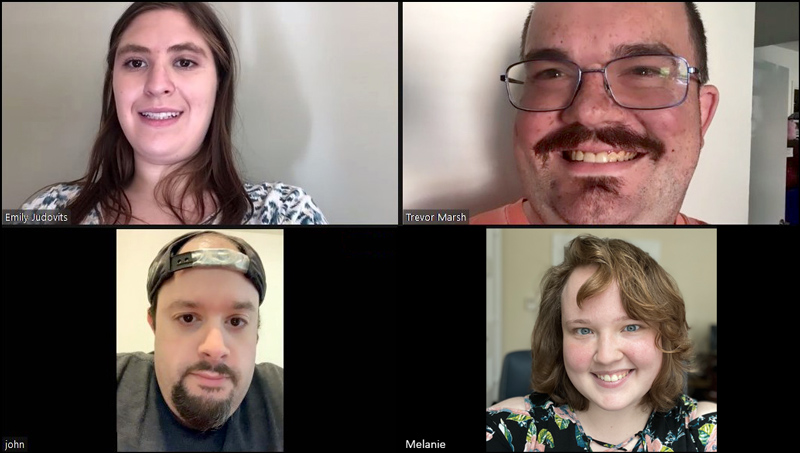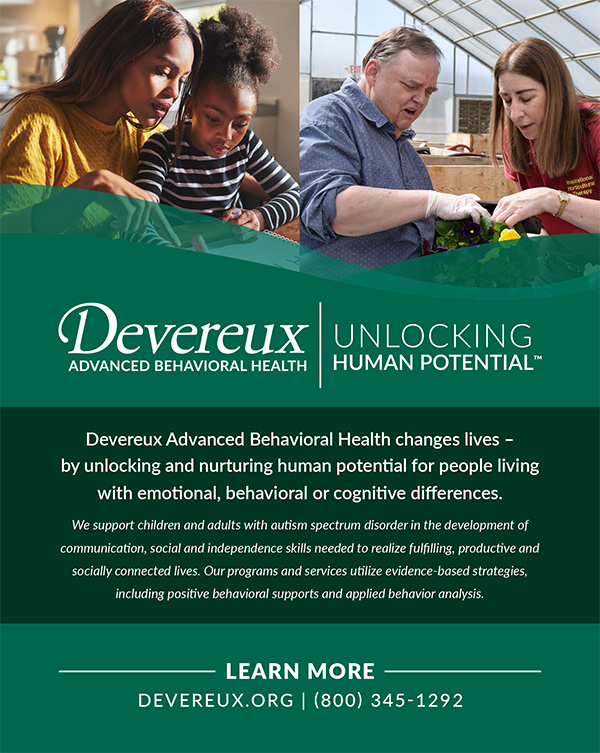The creation of self-advocacy is a story that is one of pioneering and revolution dating back as far as 1968 (Glumbić et al., 2022). Today, many self-advocacy organizations target elevating neurodiverse voices and providing space for neurodiverse individuals to advocate for themselves. The current self-advocacy movement has helped neurodiverse individuals find their voice and autonomy. This movement has also helped professionals working with neurodiverse individuals understand their point of view and understand the individual needs of each person (Zuber & Webber, 2019).

Three of Devereux CAAPP’s neurodiverse self-advocates, Emily, Trevor, and John, attending a Zoom advocacy group. Also pictured is self-advocate Melanie, a neurodiverse student who attends West Chester University.
The self-advocacy movement has shown it is best to hear the voices of neurodiverse individuals to better understand their viewpoint on this topic. Therefore, it was important to interview neurodiverse adults and include them as contributors to this article. Melanie Schwartz attends West Chester University and consults with Devereux’s college preparation course for autistic high school students. Emily Judovits, Trevor Marsh, and John Pagnoni participate in Devereux’s Community Adult Autism Partnership Program (CAAPP) and are each meaningfully employed. All passionate self-advocates, Melanie, Emily, Trevor, and John were interviewed to provide other neurodiverse individuals with tips on how to become your own advocate.
Tips to Becoming a Self-Advocate
The following are the top three tips to becoming a self-advocate from our neurodiverse interviewees:
- Find Your Voice – John, Trevor, and Emily mentioned that being more active and present in meetings surrounding their services and needs made them feel more in control about their lifestyle choices and support. The neurodiverse adults mentioned that with more learned skills, they were able to play a larger role in their Individual Support Plan (ISP) meetings. ISP’s provides assessment results, background information of the individual, and a list of individualized recommended services for an adult with neurodiverse needs, such as autism spectrum disorder or intellectual disability. The interviewees reported that they wished they knew more about the possible services available to them and/or learned skills on how to explain their needs to others at educational meetings and advocate for needs not currently being met. Research has shown that of those autistic individuals who attend their Individualized Education Plans (IEP) meetings, most were minimally involved with the meeting and transition planning (Chandroo et al., 2018). When neurodiverse students are more involved in their education planning at a young age, it helps teach neurodiverse individuals self-determination skills and thus has positive long-term effects (e.g., higher academic achievement, higher ratings of quality of life; Chou et al., 2016).
- Find a Mentor – John, Trevor, and Emily all discussed what being a mentor and mentee meant to them and how it has influenced their self-advocacy skills. Emily recalled a recent situation in which she had to make a difficult decision on where she would like to live. She was able to initiate a conversation with her support staff and stated, “[A mentor] helped me look through different possibilities on where to live.” She was then able to make an informed decision with support from her staff. Emily’s mentor knew that she was able to make the right decision for herself but was there to provide her with the information and education surrounding each choice.
Mentoring others is just as important as having a mentor. For example, Trevor discussed that he has attended provider resource fairs to talk to individuals about the programs that he attends. Trevor also stated the importance of people understanding the resources that are available to them because he didn’t know about these resources himself at one point. John talked about owning his own restaurant one day and employing individuals with disabilities, stating, “I want to give people with disabilities a place to work, building a resume, learning how to cook and be proud of something.” John also stated that his hope is that people will understand that neurodiverse individuals are more capable of employment and working jobs “typically” associated with people who have a disability (i.e., bagging groceries).
Although the mentorship described by these interviewees primarily involved that from support staff and from peers, research specifically related to peer-to-peer mentorship is becoming more frequent with a goal of understanding its efficacy with neurodiverse individuals. Literature already shows that peer mentorship for neurodiverse adults can enhance social interactions, communication skills, and increase social supports in postsecondary settings (Duerksen et al., 2021).
- Enhance Your Problem-Solving Skills – Melanie, Trevor, and John all reported on how problem-solving skills assisted with their self-advocacy skills. At times while self-advocating, it may be necessary to problem solve. Not willing to understand or being close-minded are just a couple of the unfortunate barriers one can run into while self-advocating Melanie Schwartz reported. Self-advocate Melanie stated, “Barriers that I have encountered are if a person is not open minded or willing to educate themselves. That is a big barrier. Also, if a person is fixated on grouping people in categories. Neurotypical solutions for neurodiverse challenges is not supportive.” As Melanie has grown to be an influential self-advocate, she simplified problem solving while advocating in a few simple steps. “First be able to verbalize what you need. Then, how are you going to make an action plan to get what you need, and finally, make a plan to take those steps to get what you need. If something comes up where you find yourself still questioning you can repeat the process.”
Prioritizing self-advocacy skills can help neurodiverse individuals find a job, live independently, help with health self-advocacy skills, and learn the ability to request accommodations (Zhang et al., 2019; Zuber & Webber, 2019), all of which are important skills to increase independence and quality of life.
Melanie, Emily, Trevor, and John identified several important skills needed in order to advocate for themselves including: facilitating and helping to run their own meetings (e.g., Individual Education Plans, Individual Support Plans), using essential problem-solving techniques to help overcome challenges they may encounter, finding a mentor to offer solicited advice, and/or mentoring individuals to access any needed resources. It is important to note that these skills have been corroborated by research and have shown positive long-term effects for neurodiverse individuals.
John wants to let the neurodiverse community know that “self-advocacy is helping those who want to be shown that they can have a voice, you can achieve your goals, never give up, have self-respect and self-worth.”
Meghan Herring, MSW, LCSW, is Licensed Clinician at Devereux SPARC, Ashley McClennen, MEd, BCBA, LBA (PA), is Clinical Manager and Michelle Heyman, MA, is a Pre-Doctoral Intern at the Devereux Community Adult Autism Partnership Program (CAAPP). Emily Judovits, Trevor Marsh, John Pagnoni, and Melanie Schwartz are neurodiverse self-advocates. For more information about Devereux Advanced Behavioral Health, please visit devereux.org.
References
Chandroo, R., Strnadova, I., & Cumming, T. M. (2018). A systematic review of the involvement of students with autism spectrum disorder in the transition planning process: Need for voice and empowerment. Research in Developmental Disabilities, 83, 8-17.
Chou, Y. C., Wehmeyer, M. L., Palmer, S. B., & Lee, J. (2017). Comparisons of self-determination among students with autism, intellectual disability, and learning disabilities: A multivariate analysis. Focus on Autism and Other Developmental Disabilities, 32(2), 124-132.
Duerksen, K., Besney, R., Ames, M., & McMorris, C. A. (2021). Supporting autistic adults in postsecondary settings: A systematic review of peer mentorship programs. Autism in Adulthood, 3(1), 85-99.
Glumbić, N., Đorđević, M., & Brojčin, B. (2022). Self-advocacy. In Digital inclusion of individuals with autism spectrum disorder (pp. 215-229). Springer Cham.
Zhang, D., Roberts, E., Landmark, L., & Ju, S. (2019). Effect of self-advocacy training on students with disabilities: Adult outcomes and advocacy involvement after participation. Journal of Vocational Rehabilitation, 50(2), 207–218. https://doi.org/10.3233/JVR-181001
Zuber, W. J., & Webber, C. (2019). Self-advocacy and self-determination of autistic students: A review of the literature. Advances in Autism, 5(2), 107-116. https://doi.org/10.1108/AIA-02-2018-0005





